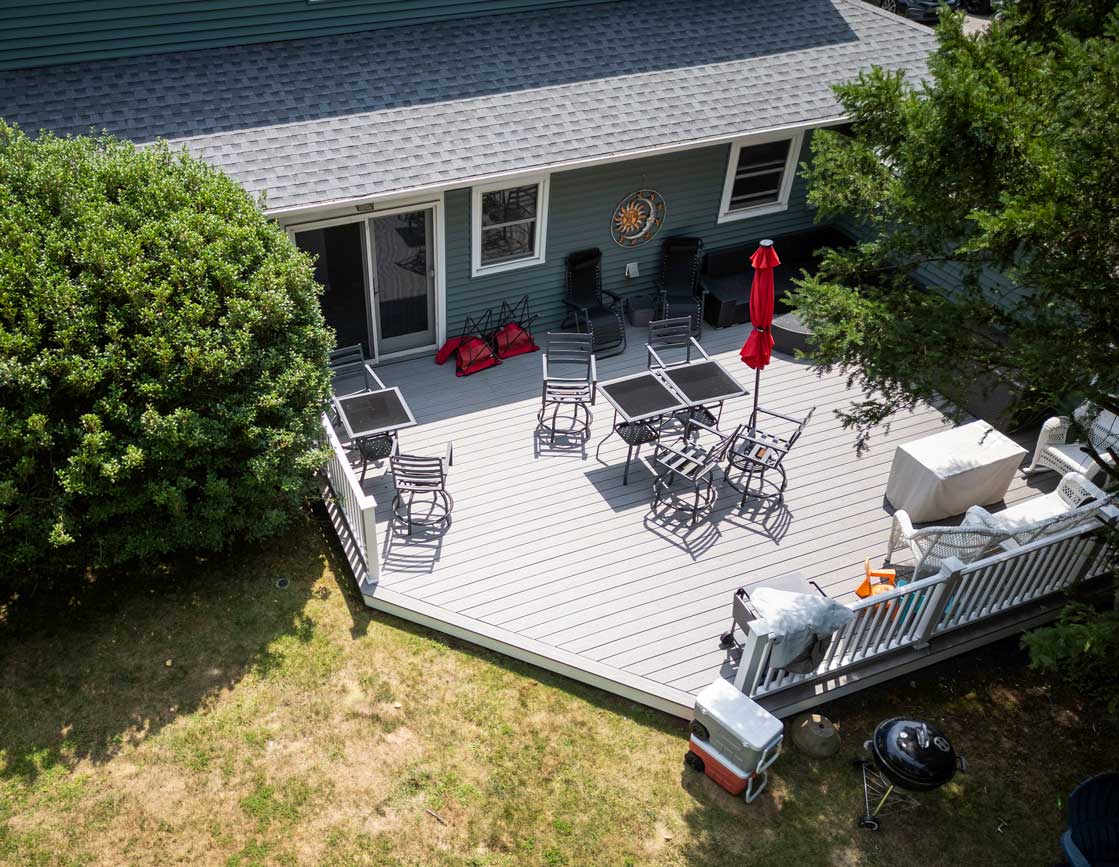
Living along Plymouth’s coast comes with its own unique set of benefits and challenges, especially when it comes to building materials. The salty air, high humidity, and fluctuating weather can take a toll on outdoor structures, particularly decks, which are constantly exposed to the elements. Choosing the right decking material is essential not only for maintaining the aesthetic of your outdoor space but also for ensuring durability and long-term performance. This article will explore the key differences between composite and traditional wood decking, helping you determine the best option for your needs in Plymouth’s coastal environment. Whether you are prioritizing style, maintenance, or weather resistance, understanding the strengths and drawbacks of each material is the first step in creating a deck that stands up to the coast’s demanding conditions.
Benefits of Composite Decking for Coastal Homes
Composite decking is a manufactured material designed to replicate the appearance of natural wood while offering enhanced durability and minimal maintenance. It is typically made from a blend of recycled wood fiber and plastic, which creates a sturdy, weather-resistant surface that is ideal for outdoor applications. The composition of these materials ensures that composite decking resists many of the common issues that traditional wood often faces, such as warping, splintering, and rotting.
One of the primary advantages of composite decking is its ability to withstand the elements. For homeowners in Plymouth’s coastal climate, this can be a significant change. The salty air and high humidity that characterize the area can accelerate wear and tear on natural wood. In contrast, composite decking is highly resistant to moisture, reducing the risk of swelling, mold, or decay. This resistance not only helps maintain the deck’s appearance but also extends its lifespan, making it a cost-effective choice overall.
Another significant benefit of composite decking is its low-maintenance nature. Unlike traditional wood, which often requires regular sealing, staining, or painting to protect it from the elements, composite decking typically only needs periodic cleaning with soap and water to keep it looking its best. This makes it particularly appealing for those who want to enjoy their outdoor space without committing to time-consuming upkeep.
In addition to durability and ease of maintenance, composite decking offers design versatility. It comes in a wide range of colors and textures, many of which mimic the look of natural wood, allowing homeowners to achieve their desired aesthetic without sacrificing performance. For Plymouth residents, this means they can create a beautiful deck that complements the surrounding coastal scenery while standing up to the harsh environment.
For families or individuals concerned about environmental impact, composite decking also holds appeal. Many manufacturers use recycled materials in their production, making it a more sustainable option compared to traditional wood. This aspect can provide peace of mind for those who wish to reduce their ecological footprint without compromising quality or durability.
Overall, the combination of weather resistance, minimal maintenance requirements, and customizable design makes composite decking an excellent choice for Plymouth’s coastal conditions. It offers a practical solution to the challenges posed by the local environment while allowing homeowners to create a functional and visually appealing outdoor space that lasts for years.
Traditional Wood Decking: Benefits and Coastal Challenges
Traditional decking, typically made from natural wood, has long been a popular choice for outdoor spaces due to its classic appearance and timeless charm. It is often constructed using hardwoods like cedar, redwood, as well as more affordable options like pressure-treated pine. This type of decking is prized for its natural beauty, with rich colors and unique grain patterns that give it a warm, inviting look. For homeowners seeking an authentic, organic aesthetic, traditional wood decking can be an appealing option.
One of the key advantages of traditional decking is its ability to be customized through staining or painting. This allows homeowners to achieve a specific color or finish that matches their overall design vision. Additionally, wood is a material that can be sanded and refinished over time, which can help restore its appearance and extend its lifespan. For those who enjoy the craftsmanship aspect of outdoor projects, wood decking provides an opportunity for hands-on care and personalization.
Despite its attractive features, traditional decking can face significant challenges in Plymouth’s coastal climate. The combination of salty air, high humidity, and temperature fluctuations can accelerate the natural aging process of wood. Without proper maintenance, wooden decks are susceptible to moisture-related issues such as warping, splitting, and swelling. Over time, exposure to these conditions can also lead to rot and decay, potentially compromising the deck's structural integrity.
In addition to moisture concerns, wood decking can be prone to mold and mildew growth in damp environments, a common issue in coastal areas like Plymouth. To combat these problems, regular maintenance is essential, including sealing, staining, or painting to protect the wood from the elements. This upkeep, while effective, can be time-consuming and may require significant effort over the years.
Another factor to consider is the vulnerability of natural wood to insect damage. Termites and other pests can pose a threat, especially in regions where wooden structures are exposed to outdoor conditions year-round. Proper treatment of the wood and routine inspections can help mitigate this risk, but these steps add to the ongoing maintenance requirements.
While traditional decking offers unmatched natural beauty and a sense of authenticity, its performance in coastal climates requires careful attention. Homeowners who opt for this material should be prepared to invest time and resources into regular upkeep to ensure the deck remains functional and visually appealing. For some, the effort is worth it for the aesthetic value that natural wood provides, but it is important to weigh these considerations against the demands of Plymouth’s challenging environmental conditions.
Comparing Decking Options for Coastal Durability and Maintenance
When comparing composite and traditional decking, several factors come into play, especially in the context of Plymouth’s coastal climate. Durability is a critical consideration, as the local environment can be particularly harsh on outdoor materials. Composite decking offers superior durability due to its resistance to moisture, warping, and rotting. This makes it a reliable choice for withstanding the salty air and humidity common in coastal areas. On the other hand, traditional wood decking, while naturally strong, is more vulnerable to the effects of moisture and requires consistent maintenance to prevent damage such as swelling, splitting, and decay.
Maintenance needs are another key distinction. Composite decking requires minimal upkeep, usually limited to occasional cleaning with soap and water. Its resistance to fading and staining means homeowners can enjoy a low-effort solution that retains its appearance over time. In contrast, traditional wood decking demands more frequent attention, such as sealing, staining, or painting, to protect it from weather-related wear and tear. These tasks, while effective, can be time-consuming and add to the overall effort of maintaining a wood deck.
Cost is often a significant factor for homeowners deciding between these materials. Composite decking has a higher upfront cost compared to traditional wood. However, its longevity and low maintenance requirements can make it more cost-effective over time. Traditional wood decking is typically less expensive to purchase initially, but the ongoing costs of maintenance and repairs may offset the initial savings, especially in environments like Plymouth’s, where the climate accelerates the aging process of wood.
Suitability for the coastal climate depends on priorities. For homeowners who value a low-maintenance, durable solution that can stand up to the challenges of salty air and high humidity, composite decking is an excellent choice. It provides reliable performance with minimal upkeep, making it particularly well suited to the demands of Plymouth’s environment. Meanwhile, traditional wood decking appeals to those who prioritize the natural look and feel of wood and are willing to invest the time and effort needed to preserve its beauty. Although it can require more care, wood’s classic aesthetic can be worth the additional maintenance for some homeowners.
Each option has its strengths, and the best choice depends on individual preferences and the level of maintenance homeowners are prepared to commit to. In Plymouth’s coastal climate, durability and weather resistance are crucial factors to weigh, alongside aesthetic preferences and long-term costs.
When deciding between composite and traditional wood decking for Plymouth’s coastal climate, the choice depends on your priorities. Composite decking stands out for its durability, low maintenance, and ability to withstand the region’s salty air, high humidity, and unpredictable weather. It requires less time and effort to maintain and offers long-term value, making it a practical option for homeowners seeking reliability and convenience.
On the other hand, traditional wood decking provides a classic, natural aesthetic that many find appealing. However, its susceptibility to moisture, rot, and insect damage, coupled with the need for regular upkeep, can make it a challenging option in Plymouth’s demanding environment. While some homeowners may appreciate the charm and craftsmanship of wood, the ongoing maintenance required may outweigh its benefits for many.
For those looking for a hassle-free, durable solution that can handle the coastal climate with ease, composite decking is the better choice. It offers a balance of performance, longevity, and design flexibility that suits the unique conditions of Plymouth’s coastal setting. However, if the warmth and authenticity of natural wood are your top priorities and you are prepared for the upkeep involved, traditional wood decking may still be worth considering. The best option will align with your preferences, lifestyle, and willingness to maintain the deck over time.
